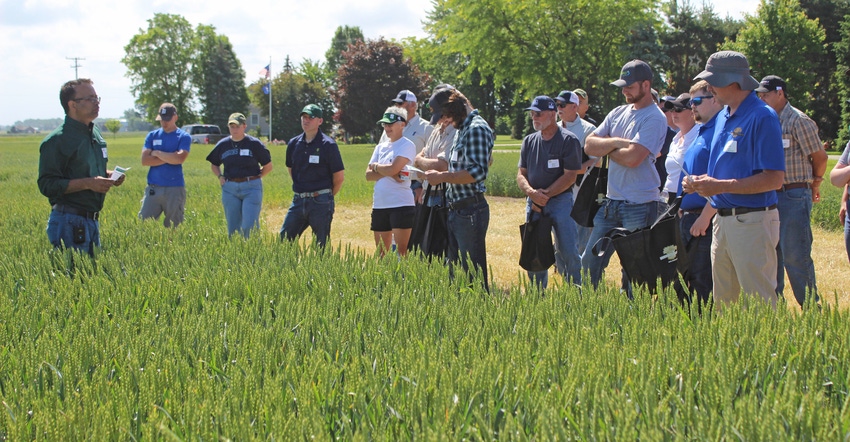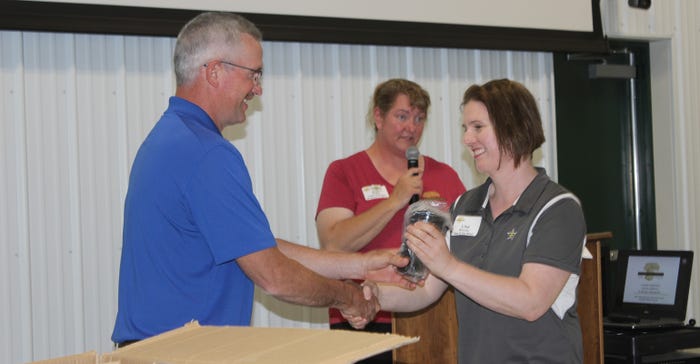June 29, 2022

After two years of cancellations because of COVID-19, the Michigan Wheat Program Field Day returned as an in-person event in 2022. Nearly 200 farmers, wheat industry and agribusiness personnel gathered June 16 at the MSU Saginaw Valley Research Center near Frankenmuth to review the latest information on wheat production practices.
The event covered an array of topics from wheat varieties, weed control and planting methods to seed treatment, disease management options and wheat canopy cover.
Michigan State University researcher Manni Singh detailed the various considerations, such as variety type and planting dates, that affect the wheat plant canopy cover and process — with the goal of getting the greatest amount of solar radiation intercepted by the growing wheat crop.

APPRECIATION: Jody Pollok-Newsom (center), executive director of Michigan Wheat Program, introduced Lisa Woodke, sustainability director of Star of the West Milling, who was presented a token of appreciation memento by MWP Chairman Jeff Krohn. Star of the West Milling was an early supporter to get program passed in 2011.
The field day and portions of the MSU research are funded by the Michigan Wheat Program, the farmer-directed commodity checkoff program.
After the field day, MWP celebrated its 10th anniversary with a lunch event that included a review of the process involved in getting approval of MWP. Many individuals, wheat industry firms and others involved in gaining approval were recognized and honored
Chapin named director of MSU Extension youth initiatives
After retiring from Michigan State University Extension in 2018, Julie Chapin has returned as director of the MSU Extension Children and Youth Institute, the unit focused on programming for those from birth to age 19, including Michigan 4-H.
“We are thrilled to have Dr. Chapin back at the helm of CYI,” says Quentin Tyler, MSU Extension director. “Julie’s strong vision, leadership acumen and passion for the 4-H Youth Development program make her an ideal candidate to help increase and improve our children and youth programs.”
Chapin has a long history with MSU Extension and Michigan 4-H that spans 36 years. A 4-H alumna from Ottawa County, Chapin began her professional career at MSU Extension in 1981 as a 4-H youth agent. She later became a youth animal science specialist before serving as state 4-H program leader for volunteer development.
In 2010, Chapin became the first director of CYI when the institute was established, a role she served in until she retired in 2018. She has been honored for her Extension service with the Michigan and National Distinguished Service awards.
“I’m so happy to be back working with the talented professionals that make up CYI and the amazing youth and families across our Michigan 4-H community,” Chapin says. “The work being done across the state by our staff and volunteers is truly making a difference in the lives of children. I look forward to helping elevate and advance this work moving forward.”
Chapin’s appointment was effective June 1.
Michigan investing more than $2.3 million in animal agriculture
The state of Michigan is making a substantial investment in its animal industry. The Michigan Alliance for Animal Agriculture is investing more than $2.3 million in 26 new research and outreach projects in 2022.
With support from the Michigan Legislature, the funding is available under the fiscal 2021-22 budget through the Michigan Department of Agriculture and Rural Development.
M-AAA is a partnership among MDARD, animal agriculture industry groups and Michigan State University aimed at advancing the animal agriculture economy across the state.
“The agriculture sector in Michigan is facing uncertainties from a variety of sources,” says George Smith, director of MSU AgBioResearch and a leader in M-AAA. “Producers are faced with short-term issues such as rising input costs, while also dealing with long-term questions around sustainability and profitability. Our partners in the M-AAA are dedicated to helping producers find solutions that propel Michigan’s animal agriculture industries into the future.”
For this funding cycle, the projects cover a range of topics, including disease-related challenges and exploring ways to increase dairy profitability.
M-AAA projects are either one or two years in duration and are slotted into one of three categories: applied research, Extension or seed funding. Researchers and outreach specialists are evaluated throughout the process and must submit progress reports and final summaries to M-AAA leaders.
For a complete list of 2022 projects, visit canr.msu.edu/maaa/projects.
80 Michigan hard cider producers awarded
Grand Rapids hosted the 16th annual Great Lakes Hard Cider and Perry Competition from May 18-20, which brought in more than 100 volunteers across the U.S. to judge, steward and provide administrative support.
Of the 1,351 entries, 1,254 medals were awarded in the commercial and noncommercial divisions. Taking best of class from Michigan were Virtue Cider, Starcut Ciders, Two K Farms and Uncle John’s. More than 80 Michigan hard cider producers were awarded medals.
You May Also Like




